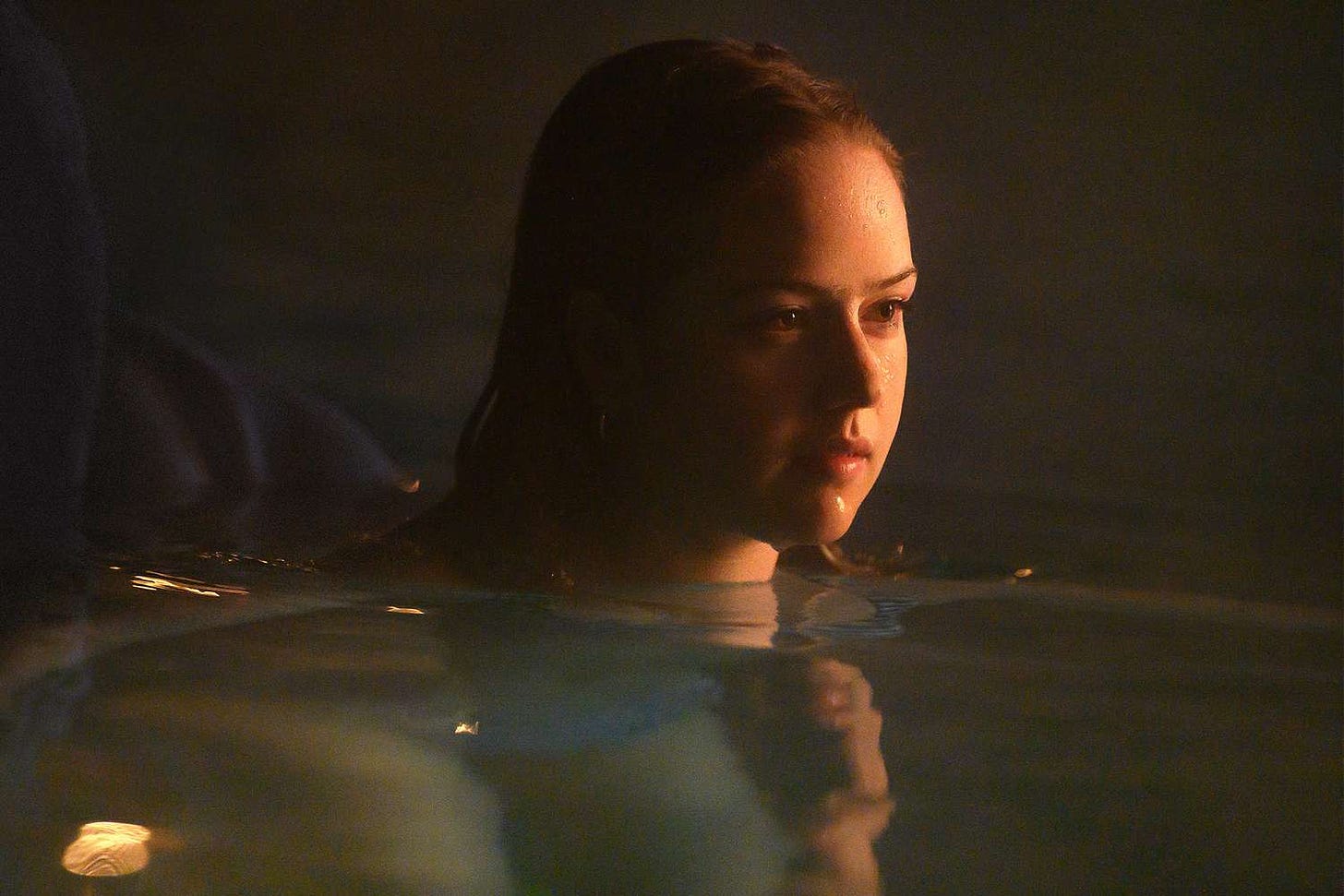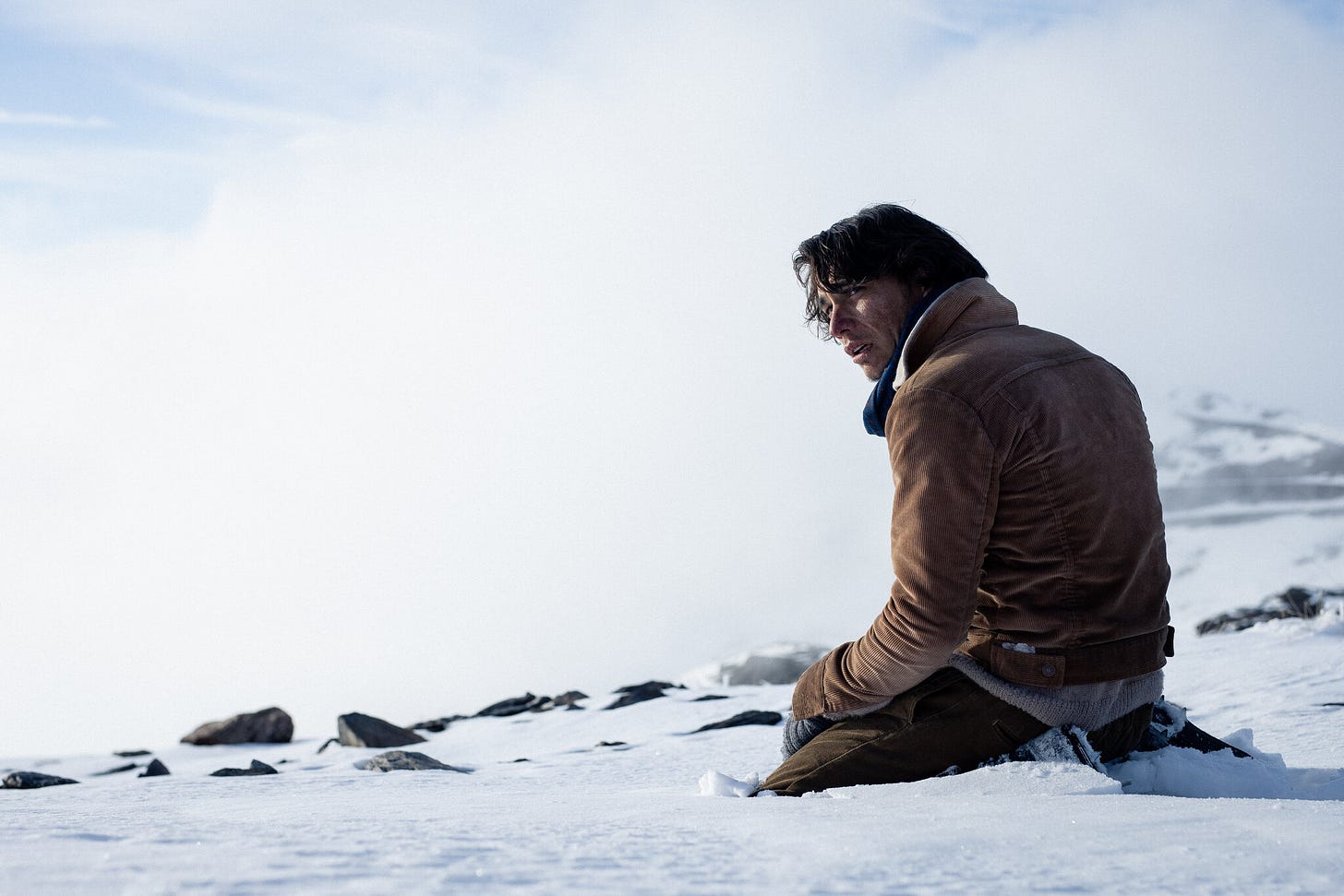In Review: 'Night Swim,' 'Society of the Snow'
The year starts with the terrors of nature and a backyard swimming pool.
Night Swim
Dir. Bryce McGuire
98 min.
The idea of a haunted backyard swimming pool that devours sunbathers looking to cool off immediately recalls the 1977 non-classic Death Bed: The Bed That Eats, a horror curio immortalized on the Patton Oswalt comedy album Werewolves and Lollipops. The funniest part about this cursed bed is that it’s tucked away in an abandoned estate, so people have to go out of their way to get eaten by it, like horny Goldilocks types looking for a place to shag. Would Night Swim work the same way, one might imagine? Would a succession of skinny dippers or pool-less neighbor kids hop over the fence and plunge into oblivion?
Regrettably, Night Swim is not that silly. Or at least it’s not silly enough. Expanding a slick three-minute short he co-directed with Rod Blackhurst, writer-director Bryce McGuire has gussied up enough intrigue to make the sort of lark that Stephen King would casually spin off into a novella. The King connection is so firm, in fact, that Night Swim alternately recalls The Shining, The Dead Zone, and especially Pet Sematary in its mix of possession, premonition and cursed rebirth. There’s just enough intelligence and craft in Night Swim to get it into real trouble, because it’s far too thin a conceit to be stretched to feature length and it’s missing the pulpiness that might have made it fun. It’s a competently executed, largely uninspired PG-13 horror movie. Who wants that?
McGuire does well to recruit a pair of excellent TV actors to lend the film all the dignity they can. Wyatt Russell, star of the late and lamented cult favorite Lodge 49, and Kerry Condon, who played Stacey Ehrmantraut on Better Call Saul, star as Ray and Eve Waller, a couple looking for an affordable place for their family to live. Their budget is tight and their future uncertain, since Ray, a professional baseball player, has been sidelined by a degenerative muscle disorder, but they luck into a fix-‘er-upper outside the Twin Cities that will allow them to settle down for the first time. Best of all, the new house has a pool, which will be great for the kids (Amélie Hoeferle and Gavin Warren) in making new friends and better still for Ray, who’s heard about the wonders of aquatics therapy.
Wonders indeed! It’s clear from the stinger of an opening that the water is sentient and malevolent, but the pool giveth as well as taketh away. As Ray experiences a dramatic improvement in health—the pool is The Overlook to his Jack Torrance—Eve and the kids are unnerved by hauntings they have trouble explaining away. To give Night Swim some credit, it doesn’t invent silly reasons for the Wallers to take a dip and it flashes a good sense of humor at times, particularly around a local real estate agent who may not have disclosed everything about the house. McGuire also stages one effective setpiece in which the daughter plays “Marco Polo” with a ghoul she believes to be a high school crush.
Yet Night Swim feels as elastic as Greg Louganis’s torso without being as twisted. There’s just not enough here for a feature, so McGuire busies himself by inventing a generations-long backstory about the origins of the pool water and overplaying the drama around Ray sacrificing his career for family. The amount of effort put into making this viable is impressive in its way, but too much energy has been invested in filling the time to give what happens during that time any oomph. The death bed scarfs down a bucket of chicken. Nothing that memorable happens here. — Scott Tobias
Night Swim opens tomorrow at theaters everywhere.
Society of the Snow
Dir. J.A. Bayona
144 min.
On October 13, 1972, a chartered flight containing forty passengers and five crew members made what should have been an unremarkable flight from Uruguay to Chile. Seventy-two days later, 16 survivors boarded helicopters sent to rescue them from a remote crash site in the Andes. Down by pilot error, the plane essentially fell apart as it crashed, leaving only the fuselage as shelter for those not killed on impact. The living endured freezing weather, avalanches, and starvation, reluctantly eating the bodies of their dead friends and loved ones to survive.
The story, which previously served as the inspiration for the 1993 film Alive, gets a second take from J.A. Bayona, the skilled Spanish director behind The Orphanage, the underrated Jurassic World: Fallen Kingdom and, most relevantly, The Impossible, another true-life tale of survival. Adapted from a 2009 book of the same name by Chilean journalist Pablo Vierci, The Society of the Snow emphasizes the often excruciating details of the ordeal, never more viscerally than in the terrifying crash sequence, which should put it on a must-never-watch list for those afraid of flying, somewhere between Cast Away and Fearless.
It’s post-crash that the film's two most significant problems start to emerge. The action is front-loaded. What follows, even the agonizing decision to resort to cannibalism, never approaches its intensity. The structure might make that unavoidable, but The Society of the Snow’s dramatic shortcomings can be tied to a second issue: Many of the survivors belonged to the Old Christians Club rugby team and, though they’re played by a talented young cast, the film does little to distinguish one character from another.
The Society of the Snow finds a central figure, of sorts, in Numa Turcatti (Enzo Vogrincic Roldán), who provides the film’s matter-of-fact voiceover. But apart from the injured Arturo Nogueira (Fernando Contigiani García), who gets a memorable monologue about how the ordeal has altered his concept of God, none of the others emerge as intriguing characters in their own right. That might be partly by design, a conscious reluctance to give the facts too much shading. More than once, Numa tells viewers that we’re to draw our own conclusions about what the experience means and whether it’s best regarded as tragedy or miracle. The film seems to agree with him, but this ends up seeming more wishy-washy than bold. Still, it is a harrowing tale, and Bayona’s significant technical skills—to say nothing of the beautiful, unforgiving locations—go a long way toward overcoming a sense that the film itself doesn’t have any notions about what it all means. But not all the way. —Keith Phipps









I'm always up for a new take on the Alive saga, ever since the original book was read aloud in class by my sixth grade teacher. Good idea? Bad? Forget about it, it was the '70s....
Fallen Kingdom is indeed underrated. Those setpieces rip! It's the only Jurassic World film I like.